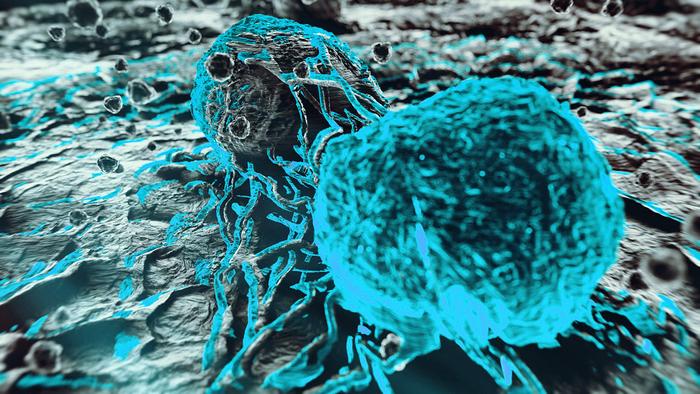HOUSTON — The University of Texas MD Anderson Cancer Center has unveiled groundbreaking insights from its latest research endeavors that bridge the discoveries in cancer therapy with practical applications in clinical settings. This integration of science and medicine is vital in transforming patient care, particularly for those facing aggressive forms of cancer that utilize immune and cellular therapies as part of their treatment regimens.
Recently published findings from numerous studies conducted at MD Anderson delineate the promising efficacy of novel cellular therapies. One standout approach involves allogeneic natural killer (NK) cells derived from induced pluripotent stem cells (iPSCs). In a pioneering Phase I clinical trial, researchers led by Dr. Paolo Strati investigated the use of FT596, an iPSC-derived chimeric antigen receptor (CAR) NK cell therapy. This therapy, which is engineered to hunt down B-cell lymphoma cells, was evaluated in a cohort of 86 patients suffering from relapsed or refractory B-cell lymphomas. Importantly, the cell therapy demonstrated a favorable safety profile, with more than 80% of participants observing significant clinical responses.
The immune landscape surrounding cancer is dynamic, and understanding the actions of these NK cells is essential. The FT596 therapy combines multiple antitumor strategies, employing a CD19-targeted CAR, an enhanced CD16 receptor, and an interleukin-15 receptor fusion protein. This multifaceted attack not only improved tolerability but also resulted in deep and durable responses across both indolent and transformed B-cell lymphomas. Notably, less than 15% of patients experienced cytokine release syndrome—a common immune reaction with potential severe complications—highlighting the therapy’s remarkable safety for this high-risk patient group.
MD Anderson’s research extends into breast cancer, an area characterized by its complexity, especially with regards to the HER2 protein. Elevated HER2 activity is implicated in several cancers, including breast and gastric. However, the therapeutic options for patients harboring specific HER2 mutations have remained largely untested. In a Phase II trial led by Dr. Paula Pohlmann, two HER2-targeted therapies, tucatinib and trastuzumab, were assessed in women with advanced HER2-negative breast cancers. The results were promising, with a response rate indicating tumor reductions in 42% of participants, offering hope for expanding treatment avenues for previously underrepresented groups.
The realm of kidney cancer was not left untouched, as researchers explored the triplet combination of sitravatinib—a potent tyrosine kinase inhibitor—paired with immune checkpoint inhibitors in advanced clear cell renal cell carcinoma (ccRCC). In another Phase I trial, led by Dr. Pavlos Msaouel, outcomes were encouraging, demonstrating an objective response rate of 45.5% in previously untreated patients. The researchers utilized advanced single-cell RNA sequencing which unveiled tumor-specific gene signatures predictive of responses, thereby informing future therapeutic strategies in this daunting cancer type.
Cardinal to the progress in non-small cell lung cancer (NSCLC) is a comprehensive understanding of the KRAS G12C mutation. Despite the availability of inhibitors like adagrasib, patient populations often face dismal outcomes. In the KRYSTAL-I study, Dr. Marcelo Negrao and his team evaluated genomic characteristics of 121 patients with KRAS G12C-mutant NSCLC. Their findings revealed that a significant subset of patients—32%—exhibited longer survival with adagrasib monotherapy, although co-mutations such as KEAP1 and STK11 served as detrimental prognostic factors. The addition of mTOR inhibitors, particularly in those with co-mutations, hinted at a path to enhanced therapeutic benefits.
Equally critical is the issue of treating refractory lymphomas, particularly patients who experience failure with established CAR T cell therapies. In a Phase I trial, researchers led by Dr. Yago Nieto investigated the collaborative effects of the PARP inhibitor olaparib alongside high-dose chemotherapy (HDC). The combination yielded an astounding complete response rate of 90% among 50 patients, with robust survival rates beyond two years, offering a beacon of hope in a patient demographic often deemed difficult to treat.
Furthermore, MD Anderson’s research is taking strides toward understanding potentially underdiagnosed cancers such as renal medullary carcinoma (RMC), predominantly affecting young individuals of African descent. In a study focusing on the molecular features of RMC, researchers identified the upregulation of the MUC16 gene, suggesting its role as a powerful clinical biomarker for early detection and prognostic evaluation. Elevated serum levels of cancer antigen 125 (CA-125) was tied to metastasis, reinforcing the potential of MUC16 as both a marker and therapeutic target.
Amidst these clinical advancements, it is imperative to acknowledge the relentless efforts of dedicated researchers and clinicians at MD Anderson who work collaboratively to bring scientific innovations from lab to bedside. Their work underscores the significance of interdisciplinary research in oncology, aiming to not only improve patient outcomes but also enhance the quality of life for those affected by cancer.
Each of these studies serves as a testament to MD Anderson’s commitment to unraveling the complexities of cancer and transforming therapeutic landscapes through research-driven insights, ultimately reiterating the message that hope and progress go hand in hand in the fight against cancer.
Subject of Research: Advances in Cancer Treatment and Research
Article Title: Breakthroughs in Cancer Care: MD Anderson Cancer Center’s Latest Research Discoveries
News Publication Date: October 2023
Web References: MD Anderson Cancer Center Website
References: The Lancet, Nature Medicine, Nature Communications, Clinical Cancer Research
Image Credits: Credit: MD Anderson Cancer Center
Keywords: cancer research, NK cell therapy, B-cell lymphoma, HER2 mutations, kidney cancer, KRAS G12C, lung cancer, lymphoma treatment, MUC16 biomarker, inflammatory pain.





